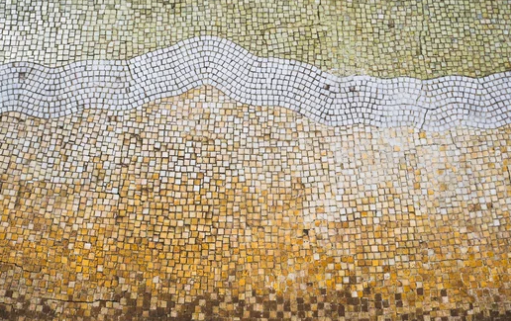I’ll never forget the moment I stepped into my friend Sarah’s home. Her entryway was adorned with a breathtaking wall of artistic mosaic tiles in shades of blue and green, creating the illusion of flowing water. It wasn’t just a wall—it was a statement that set the tone for her entire home. “It’s amazing how something so simple can change everything,” she remarked, and I couldn’t agree more. Those tiles weren’t just decorative; they were transformative.
The Narrative Power of Artistic Mosaic Tiles
What sets artistic mosaic tiles apart is their ability to tell stories. Unlike plain tiles that merely cover a surface, mosaics weave narratives through color, pattern, and texture. They’re like tiny pieces of art that come together to create something extraordinary. I’ve seen bathrooms with backsplashes that evoke Mediterranean seascapes and kitchen islands that become focal points with intricate geometric patterns. Each installation reflects the personality of the homeowner, making the space uniquely theirs.
Discovering Your Design Style
The versatility of artistic mosaic tiles is their greatest strength. You don’t need to cover an entire wall to make an impact. Sometimes, a small, thoughtful addition can transform a space. For example, I once helped a client enhance her reading nook by adding a mosaic border that mirrored the colors of her favorite book covers. That simple touch turned a forgotten corner into her favorite spot in the house.
When selecting artistic mosaic tiles, consider the story you want to tell. Are you drawn to the bold patterns of Moroccan designs or the sleek lines of contemporary styles? The key is to choose tiles that resonate with your personal aesthetic while complementing your existing décor.
Creating Harmony Throughout Your Home
Artistic mosaic tiles have the unique ability to create flow and connection between spaces. I discovered this while helping my sister renovate her split-level home. By using similar colored tiles in different patterns, we subtly connected areas that once felt disjointed. The result was a home that flowed seamlessly from one room to the next, with each space maintaining its own character.
Here’s a tip: Choose one element—color, pattern, or texture—and let it guide your design. For instance, if you love blue artistic mosaic tiles for your kitchen backsplash, incorporate smaller blue accents throughout your home. This creates cohesion without being overly matchy.
Practical Tips for Using Artistic Mosaic Tiles
While the creative possibilities are endless, there are practical considerations to keep in mind:
-
Maintenance: Intricate patterns may require more cleaning effort.
-
Lighting: Consider how natural and artificial light will interact with your tiles.
-
Scale: Ensure the size of your pattern works with the space.
-
Durability: Choose tiles that can withstand their intended use.
Striking the Perfect Balance
The secret to using artistic mosaic tiles effectively lies in finding the right balance between bold expression and subtle sophistication. You want your design to make a statement without overwhelming the space. Even the most dramatic installations can feel natural when thoughtfully integrated into the overall design.
Take Sarah’s entryway, for example. What made it work wasn’t just the tiles themselves but how they complemented the surrounding elements. The colors echoed artwork in adjacent rooms, and the flowing pattern created a sense of movement that guided visitors through the space.
Your Journey to a Cohesive Home
As you explore the world of artistic mosaic tiles, start by observing what inspires you. What colors make you feel at ease? What patterns catch your eye? Use these insights as your foundation, and don’t hesitate to experiment with samples before committing to a design.
Artistic mosaic tiles offer endless possibilities, whether you’re envisioning a show-stopping feature wall or subtle accents throughout your home. They’re a versatile tool for creating spaces that feel both personal and polished. Your home should tell your story—let artistic mosaic tiles be the medium through which you express it.

